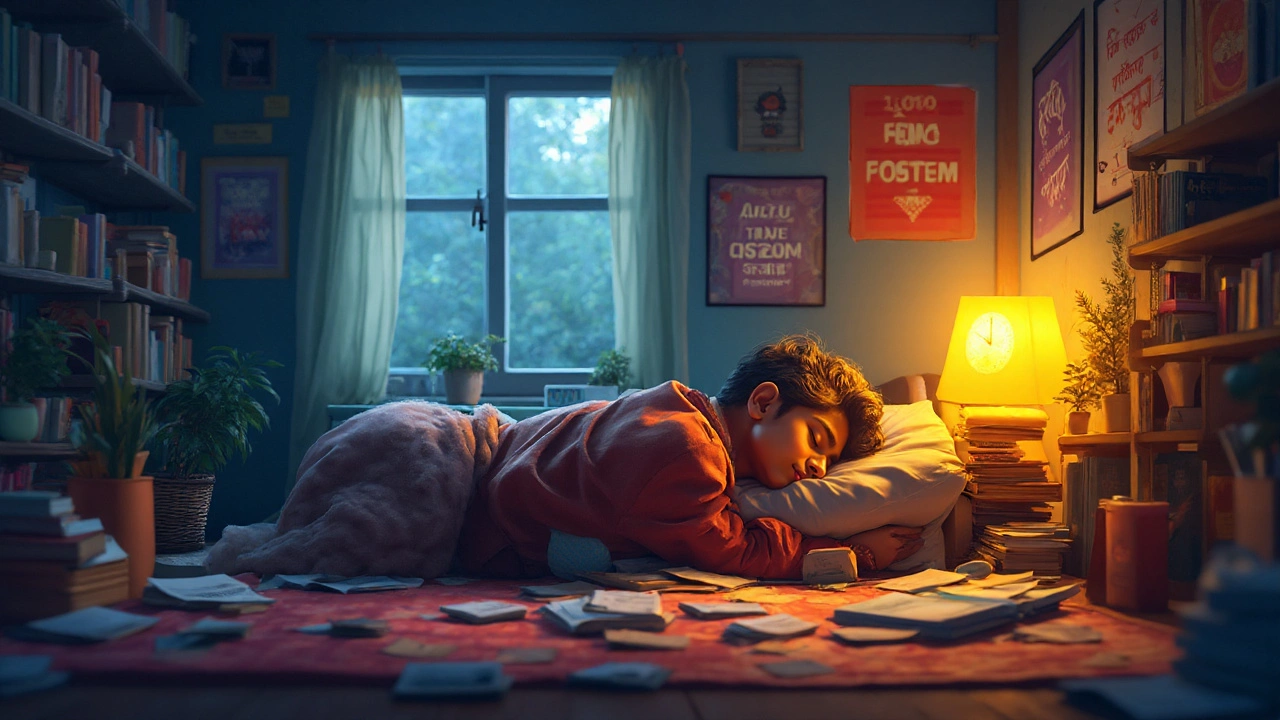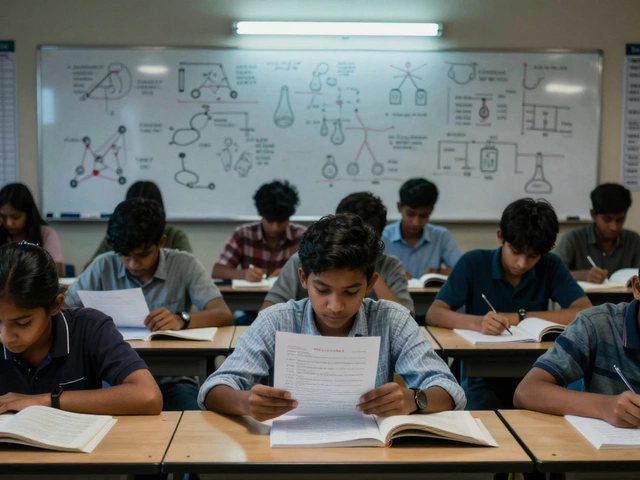If you asked ten JEE aspirants how much they slept last night, you'd probably get ten wildly different answers. Some might brag about burning the midnight oil, others about waking at 4 a.m. It’s tempting to treat sleep as a luxury when there are reams of notes to cover and mock tests to ace. But here’s a truth that stings: not getting enough sleep can erase hours of hard work in a blink. A famous experiment by Harvard Medical School found that people deprived of even two hours of needed sleep performed simple math problems with the same accuracy as someone legally drunk. Yikes! So, is there a magic number of hours you need to hit for JEE prep? Not quite, but science points to something between 7 and 8 hours a night for teen brains—no negotiating.
The Science Behind Sleep and JEE Prep
Our brains act like supercomputers, sure, but even supercomputers overheat and glitch without cool-down time. When you’re cramming for the JEE, your hippocampus—the part of your brain that stores facts and memories—works overtime. If you miss out on enough restorative sleep, it throws everything off. In 2023, a study published in Nature Reviews Neuroscience showed teenagers experience major memory consolidation during the deep phases of sleep. That’s the part where everything you slogged through in those 400-page chemistry tomes gets filed for future use, not just lost in the attic.
For JEE aspirants, good sleep isn’t a soft option or nice-to-have; it actually cements learning and recall. Sleeping less than 6 hours a night for just a week impairs attention and logical reasoning—two skills you absolutely need during those three high-pressure hours of the JEE Main or Advanced exam. From personal experience and watching my son Fletcher and his buddies struggle with endless schoolwork, I’ve seen the day-after-zombie look in the kitchen—eyes rimmed red, breakfast barely touched. What happens? They blank out on easy topics during practice tests. The guilt and regret set in until they try to tough it out with even less sleep. It’s a vicious cycle.
If you keep squeezing sleep to “make time” for more chapters, you’re only hurting your memory, speed, and creativity. During deep sleep, your brain forms neural connections—links between “benzene ring” and “aromatic stability” or between “kinematics” and “motion graphs.” Skip sleep, and you keep groping for words mid-answer, or draw blanks at the worst possible moment. You might think you’re getting ahead, but you’re only sabotaging yourself. Multiple schools in Bangalore and Kota actually now include “sleep education” sessions for aspirants because persistent sleep debt led to a drop in average results. Their findings? Students hitting 7-8 hours scored, on average, 13% higher on practice exams than those who cut back to 5-6 hours.
| Sleep Duration | Median Practice Test Score (%) | Common Issues Observed |
|---|---|---|
| 8+ hours | 84 | Stable mood, sharp memory, less stress |
| 6-7 hours | 76 | Mild forgetfulness, lower focus |
| 5 hours or less | 63 | Poor recall, brain fog, anxiety spikes |
It’s not all about quantity, though. The quality of sleep matters too. If you game until midnight or scroll through endless reels before bed, you might go to bed “early” but still toss and turn, wrecking sleep cycles. The blue light from screens literally tells your brain to “stay awake.” And trust me, even my dog Bramble, who passes out into a pile of snoring fur by 9 p.m. every day, gets better deep sleep than most teens armed with smartphones.

Common Myths About Sleep and Exam Performance
Let’s bust some of the sleep myths floating around JEE prep groups. Myth one: “Studying at night is more effective.” Sure, night owls might think they’re productive after dark, but science disagrees. The natural rhythm of teen bodies—the circadian rhythm—wants you to wind down by 10 or 11 p.m. Ignore it, and not only do study sessions drag (ever re-read the same line a dozen times?), but memory recall tanks too. Another whopper: “Top rankers don’t need sleep.” The 2024 AIR 1, Ayush Kumar, openly shared in interviews that he stuck to a steady 7 hours, no matter how stressed. His secret wasn’t superhuman grit but smart routine and solid sleep habits.
Another myth that gets tossed around: “Caffeine can replace sleep.” Temporary fix, sure. Rely on it long-term, and your concentration starts bouncing around like a sugar rush gone wild. Worse, the crash leaves many feeling jittery and anxious right when they need to be calm. I’ve seen it up close—Fletcher once downed two energy drinks before a mock test, and I spent the afternoon convincing him to nap and stop spiraling over silly errors. Caffeine also cuts into deep-sleep cycles later at night, meaning you lose out both ways.
Some folks believe “Power naps can make up for lost nighttime sleep.” Quick breaks help, but they’re no substitute for full cycles of REM and deep sleep, which usually only happen at night. Your brain needs time to run through all stages of sleep to lock in information and manage stress. Another fun fact: Stanford’s Sleep Medicine Department found that even top student-athletes—kids who train as hard as JEE aspirants study—perform up to 30% better when they sleep 8 hours routinely. Bragging about all-nighters is a badge of poor planning, not toughness.
- Sleep debt adds up throughout the week; lost hours aren’t fully recoverable by “sleeping in” on Sundays.
- Using sleep as a reward (“I’ll finish three chapters, then sleep!”) just increases stress and anxiety, making sleep harder.
- Missing sleep messes with hormones controlling appetite, so you might notice feeling hungrier, craving more sugar, and feeling irritable—none of which help productivity.
- Rumors that “a new mattress or sleep medicine is magic” usually aren’t true; basics like a cool, quiet room and routine matter far more.
If anyone in the house (yes, even Leo, who thinks he’s a sleep expert after reading one health magazine) tells you to “just sleep less, you’re young!” you have every reason to roll your eyes. Your brain is building long-term success during those precious hours—not just surviving another rushed day.

Practical Tips to Optimise Sleep and Study for JEE
So, what can you actually do to make sleep and studies work together, not compete? Start by building a no-compromise night routine. Set a target—8 hours for most, maybe 7 if you truly thrive on less, but never, ever dip below 6. Block off “bedtime” like you would the most important tuition session of the day. Use alarms not just for waking up, but for reminding you to start winding down at night. If you need proof, check out the way athletes (and even astronauts) stick to bedtime rituals like they’re prepping for a rocket launch.
Try this for a week: Shut your books 30 minutes before lights-off, stash all screens (yes, even that group chat buzzing at midnight), and doodle or read a paper book instead. The point? Give your brain a break. A group of JEE toppers from Kota shared in their blogs that a tech-free wind-down doubled their deep sleep hours. Seems simple, but even background TV or music can keep your brain whirring. If your room’s noisy or hot, try an eye mask or earplugs. A fan or white noise app can drown out street sounds.
Morning routines matter too. Start the day with sunlight—open the windows, step outside, even if it’s just to walk Bramble around the block. That natural light resets your biological clock and helps you wake up fresher. Avoid hitting snooze repeatedly; every extra 5-minute nap actually fogs your thinking more than helps. Eat a solid breakfast, hydrate, and maybe fit in a short stretch or jog. Physical activity in the morning or late afternoon (not at bedtime!) actually makes you sleep better at night.
If stress or anxiety messes with your sleep, steal tricks from the pros: journaling, a to-do list before bed, or classic deep breathing exercises. One easy favorite: inhale for 4 seconds, hold for 4, exhale for 8. It signals your nervous system that “it’s safe, let’s relax.” And if worry still keeps you up, talk to someone—parent, friend, or coach. Pretending stress away never works for long.
- Keep caffeine to mornings only. That post-lunch coffee or cold drink can stick around in your brain until midnight.
- Watch your diet: eating heavy or spicy foods late can mess with tummy and sleep both.
- If you must nap, set a timer for 15-20 minutes, ideally before 4 p.m.—just a quick recharge, not a full sleep cycle.
- Try not to study on the bed. Make your brain see that as a “sleep zone,” not a “work zone,” or it may link the two and stay hyper-alert.
- On exam eve, don’t try to “revise everything one last time.” Do a light, confident review and hit the pillow on time. Panic fixes almost nothing.
If you’re managing school, coaching, and self-study like a plate-juggler, remember sleep isn’t what you push off for later. It’s as central as the best books or revision plans. Try tracking your sleep with a notebook for a week—you might be surprised at the patterns and how much more focused you feel. JEE prep is a marathon, not a sprint, and every hour of deep sleep is like good fuel in the tank. You totally owe it to yourself—and, trust me, even dog Bramble can teach you how to nap guilt-free when you really need it.


